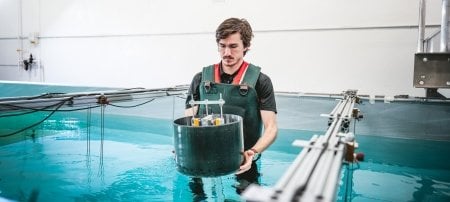Research at Michigan Tech has branched out into forest biomaterials. Check out this video and see the forest bioeconomy for the trees.

Forest Biomaterials Research
Biomaterials are any organic materials that can be cultivated or extracted from nature’s ecosystems; any organic material extracted from the forest is considered a forest biomaterial. Considering the nearly 20 million acres of forested landscape in Michigan, it makes sense that a forest biomaterials industry would flourish here.
According to Mark Rudnicki, a professor of practice in forest biomaterials at Michigan Technological University, Michigan ranks ninth in the nation in acres of forest cover. It's also home to several forest-related industries, including forestry and logging, wood products manufacturing and paper manufacturing. In 2013, Michigan Tech initiated the development of a broad coalition – with members from Michigan industry, government and academia – to facilitate the cultivation of new ways to use forest biomaterials.
The initiative has evolved into the Michigan Forest Biomaterials Institute (MiFBI) and Rudnicki is its executive director.
“We’re looking to support existing industries while facilitating the next generation of forest biomaterials,” Rudnicki says. “Getting the message out about opportunities in the forest is very important.”
Michigan Technological University is an R1 public research university founded in 1885 in Houghton, and is home to nearly 7,500 students from more than 60 countries around the world. Consistently ranked among the best universities in the country for return on investment, Michigan's flagship technological university offers more than 120 undergraduate and graduate degree programs in science and technology, engineering, computing, forestry, business, health professions, humanities, mathematics, social sciences, and the arts. The rural campus is situated just miles from Lake Superior in Michigan's Upper Peninsula, offering year-round opportunities for outdoor adventure.






Comments